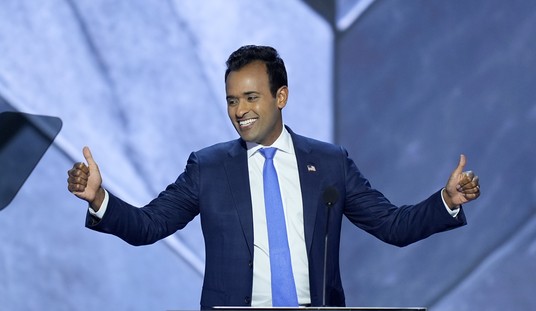Charles Krauthammer reminds a dazed American public that the Obama administration is facing not just one, but three simultaneous foreign policy challenges.
Three crises, one president, many bewildered friends.
The first crisis, barely noticed here, is Ukraine’s sudden turn away from Europe and back to the Russian embrace…
The second crisis is the Middle East — the collapse of confidence of U.S. allies as America romances Iran. …
The third crisis is unfolding over the East China Sea, where, in open challenge to Obama’s “pivot to Asia,” China has brazenly declared a huge expansion of its airspace into waters claimed by Japan and South Korea.
Part of the problem with the administration is that it can’t clear a backlog. Past crises don’t get solved. They get forgotten. Overwritten by the fresh news cycle. The Washington Post reminds its readers that, as we near 2014, the capture of the 2012 Benghazi consulate attackers has stalled.
U.S. officials say efforts have stalled to capture about a dozen people secretly charged in the 2012 attack on the American compound in Benghazi that claimed the lives of U.S. Ambassador J. Christopher Stevens and three other Americans.
The individuals have been charged in sealed criminal complaints filed in federal court by the U.S. Attorney’s Office for the District of Columbia. They include one of the suspected ringleaders of the attack, Ahmed Abu Khattala, a militia leader with ties to al-Qaeda, said several U.S officials, speaking on the condition of anonymity because they were not authorized to discuss the case publicly.
So far, none have been brought to trial and the lack of progress in capturing Khattala has frustrated U.S. intelligence officials and lawmakers who want to see him and the others prosecuted. One official said that Khattala continues to operate in eastern Libya with impunity.
“He’s as free as a bird,” the official said.
Benghazi’s old news already and soon to be forgotten. Part of the problem may be the management process at the White House. Peggy Noonan characterized the current Executive Offices as more akin to Animal House than anything else.
People say Mr. Obama never had to run anything, but it may be more important that he never worked for the guy who had to run something, and things got fouled up along the way and he had to turn it around. He never had to meet a payroll, never knew that stress. He probably never had to buy insurance! And you know, his policies were probably gold-plated—at the law firm, through his wife’s considerable hospital job, in the Illinois Legislature, in the U.S. Senate. Those guys know how to take care of themselves! Maybe he felt guilty. Maybe that’s to his credit, knowing he was lucky. Too bad he didn’t know what he didn’t know, like how every part has to work for a complicated machine to work.
Here I will say something harsh, and it’s connected to the thing about words but also images.
From what I have seen the administration is full of young people who’ve seen the movie but not read the book. They act bright, they know the reference, they’re credentialed. But they’ve only seen the movie about, say, the Cuban missile crisis, and then they get into a foreign-policy question and they’re seeing movies in their heads. They haven’t read the histories, the texts, which carry more information, more texture, data and subtlety, and different points of view. They’ve only seen the movie—the Cubans had the missiles and Jack said “Not another war” and Bobby said “Pearl Harbor in reverse” and dreadful old Curtis LeMay chomped his cigar and said “We can fry a million of ‘em by this afternoon, Mr. President.” Grrr, grrr, good guys beat bad guys.
It is a suggestion that Jay Carney rejects. He rejected charges that Kathleen Sebelius met only rarely with the president during the Obamacare rollout by saying the records do not always reflect actual interactions.
“Cabinet secretaries don’t regularly get entered into the White House visitors logs, [though] they come frequently. Kathleen Sebelius comes frequently, and she meets frequently with the president.”
Without citing specific figures, Carney said it was “safe to say Kathleen Sebelius has been one of the more frequent attendees to meetings with the president.”
The assertion that Sebelius meets the president more frequently than others is one of relative frequency. It says nothing about the actual frequency. What Carney maintains is that the president informally solves problems in ways we can’t measure. Off the record discussions, informal consulations — these are not reflected in the record.
Glenn Kessler of the Washington Post uses the same argument to debunk the charge that Obama doesn’t read his security briefings. Kessler says he gets his information in other ways.
Clearly, different presidents have structured their daily briefing from the CIA to fit their unique personal styles. Many did not have an oral briefing, while three — two of whom are named Bush — preferred to deal directly with a CIA official. Obama appears to have opted for a melding of the two approaches, in which he receives oral briefings, but not as frequently as his predecessor.
This hands off approach wouldn’t be half bad if only the president’s enormous appetite for power were scaled back to match his supervisory energy. Watchdog Wire in Nevada notes that Harry Reid designed the Obamacare statute to concentrate practically every lever of power into the Executive’s’ hands.
Basically, the legislation said, “We here in the Senate have some ideas on how to rejigger one-sixth of the American economy, but we’ll be leaving the details to you and the White House.”
That’s why — within the approximately 2,700 pages of the bill put together by Reid, his lieutenants and his staff — the phrase, “the Secretary,” appears 3,120 times.
Among them are 953 appearances of the phrase, “the Secretary shall,” and 348 appearances of the phrase, “the Secretary may.”
“As determined by the Secretary,” appears 84 times, and “As the Secretary determines,” appears 81 times. Fifty-five times the bill states, “the Secretary shall ensure,” and 28 times it either says “the Secretary shall specify,” “the Secretary shall promulgate regulations,” or “the Secretary shall develop standards.”
According to the ranking member on the Senate Committee on Finance, U.S. Sen. Chuck Grassley, the Reid bill on 1,697 occasions authorized the HHS Secretary to write additional regulations beyond those already specifically requested in the legislation.
The accusation that Obama rarely — or only comparatively rarely met Sebelius — acquires enormous significance in that context. It is because they had amassed so much power over 1/6th of the American economy in their hands that the lack of supervision becomes so damning. The necessary corollary to the liberal belief that government can do everything is the requirement to actually do it.
Yet once they had gathered the controls into their hands, the White House appeared to have forgotten completely about it and moved on to the next distraction. Sebelius herself told the public that the president was unaware of the Obamacare website problems until he read it about in the papers.
Benghazi, the Ukraine, the Middle East, China, Obamacare — are regarded not as governance problems to be solved but crises never to be wasted. They are news cycle events to be spun. Opportunities for more power.
Burned consulates, fighting displacing millions, the prospect of a nuclear breakout, the danger of war in the Pacific, the cancellation of millions of policies, the ruin of myriad lives are nothing but random objects spinning in the wake of a ship of state madly dashing across an uncharted ocean.
“Was it over when the Germans bombed Pearl Harbor?” Nah it ain’t over till we say it is. Then it’s old news.
Spiderman once said, “with great power comes great responsibility.” But maybe Obama has never heard of Peter Parker. Obama’s own maxim appears to be: with great power comes the need for greater power.
Did you know that you can purchase some of these books and pamphlets by Richard Fernandez and share them with you friends? They will receive a link in their email and it will automatically give them access to a Kindle reader on their smartphone, computer or even as a web-readable document.
The War of the Words for $3.99, Understanding the crisis of the early 21st century in terms of information corruption in the financial, security and political spheres
Rebranding Christianity for $3.99, or why the truth shall make you free
The Three Conjectures at Amazon Kindle for $1.99, reflections on terrorism and the nuclear age
Storming the Castle at Amazon Kindle for $3.99, why government should get small
No Way In at Amazon Kindle $8.95, print $9.99. Fiction. A flight into peril, flashbacks to underground action.
Storm Over the South China Sea $0.99, how China is restarting history in the Pacific










Join the conversation as a VIP Member